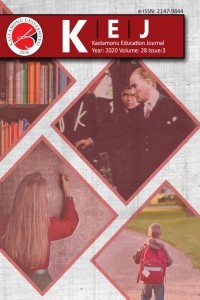Lise Matematik Öğretmeni Adaylarının Öğretmenlik Deneyimleri: Teoriden Uygulamaya Geçiş
Pedagojik alan bilgisi, matematik öğretmeni adayları, öğretim bilgisi, öğrenci bilgisi
An Investigation of Prospective Secondary Mathematics Teachers’ Experience on Teaching: From Theory to Practice
Pedagogical content knowledge, prospective mathematics teachers, knowledge of instruction, knowledge of students’ thinking,
___
- An, S.,Kulm, G., & Wu, Z. (2004). The pedagogical content knowledge of middle school, Mathematics teachers in China and the U.S. Journal of Mathematics Teacher Education, 7(2), 145–172.
- Auerbach, C. F., & Silverstein, L. B. (2003). Qualitative data: An introduction to coding and analysis. New York, NY: New York University Press.
- Baumert, J., Kunter, M., Blum, W., Brunner, M., Voss, T., Jordan, A., & others (2010).Teachers’ mathematical knowledge, cognitive activation in the classroom, and student progress. American Educational Research Journal, 47(1), 133–180.
- Carpenter, T. P., Fennema, E., Peterson, P. L., & Carey, D. (1988). Teachers’ pedagogical content knowledge of students’ problem solving. Journal of Research in Mathematics Education, 19(5), 385-401.
- Chick, H. L., Baker, M., Pham, T., & Cheng, H. (2006). Aspects of teachers’ pedagogical content knowledge for decimals. In J. Novotná, H. Moraová, M. Krátká, & N. Stehlíková (Eds.), Proceedings of the 30th annual conference of the International Group for the Psychology of Mathematics Education (Vol. 2, pp. 297-304). Prague, Czech Republic: PME.
- Feiman-Nemser, S.,&Parker, M. B. (1990).Making Subject Matter Part of the Conversation or Helping Beginning Teachers Learn to Teach. (Research Report No.90-3) East Lansing,MI: National Center for Research on Teacher Education.
- Fennema, E. &Franke, M. L. (1992).Teachers’ knowledge and its impact. In D. A. Grouws (Ed.), Handbook of research on mathematics teaching and learning (pp. 147-164). New York: Macmillan.
- Grossman, P. (1990). The making of a teacher: Teacher knowledge and teacher education. New York, NY: Teachers College Press.
- Grouws, D. A. & Schultz, K. A. (1996). Mathematics Teacher Education. In J. Sicula, T. Buttery & E. Guyton (Eds.), Handbook of Research on Teacher Education (pp. 442-458). New York: Macmillan Library Reference USA.
- Hacıömeroğlu, G. (2013). Sınıf öğretmeni adaylarının öğretim için matematiksel bilgisi: Öğrencilerin Toplama ve çıkarma işlemlerine ilişkin çözüm yollarının analizi. Eğitim ve Bilim, 38(168), 303-317.
- Hill, H. C., Ball, D. L., & Schilling, S. G. (2008). Unpacking Pedagogical Content Knowledge: Conceptualizing and Measuring Teachers’ Topic-Specific Knowledge of Students. Journal for Research in Mathematics Education, 39(4), 372–400.
- Kinach, B. M. (2002). A cognitive strategy for developing pedagogical content knowledge in the secondary mathematics methods course: toward a model of effective practice. Teaching and Teacher Education, 18(1), 51–71.
- Kleickmann, T., Richter, D., Kunter, M., Elsner, J., Besser, M., Krauss, S., et al. (2013). Teachers’ pedagogical content knowledge and content knowledge: the role of structural differences in teacher education. Journal of Teacher Education, 64(1), 90–106.
- Lannin, J. K., Webb, M., Chval, K., Arbaugh, F., Hicks, S., Taylor, C., & Bruton, R. (2013). The development of beginning mathematics teacher pedagogical content knowledge. Journal of Mathematics Teacher Education, 16(6), 403-426.
- MEB (2013).Ortaöğretim (9-12) Matematik Dersi Öğretim Programı. Milli Eğitim Yayınları, Ankara.
- Oliveira, H., & Hannula, M. S. (2008). Individual prospective mathematics teachers: Studies on their professional growth. In K. Krainer & T. Wood (Eds.), Participants in mathematics teacher education (Vol. 2, pp. 13–34). Rotterdam: Sense Publishers.
- Patton, M. Q. (2002). Qualitative research and evaluation methods. Newbury Park: Sage Publication.
- Romberg, T. A., & Carpenter, T. P. (1986). Research on teaching and learning mathematics: Two disciplines of scientific inquiry. In M. C. Wittrock (Ed.), Handbook of research on teaching (3rd ed.,pp. 850-873). New York: Macmillan.
- Shulman, L.S. (1986). Those who understand: Knowledge growth in teaching. Educational Researcher, 15, 4–14.
- Shulman, L.S. (1987). Knowledge and teaching: Foundations of the new reform. Harvard Educational Review, 57, 1 – 22.
- Toluk-Uçar, Z. (2009). Developing pre-service teachers understanding of fractions through problem posing. Teaching and Teacher Education, 25, 166-175.
- Toluk Uçar, Z. (2011). Öğretmen adaylarının pedagojik içerik bilgisi: Öğretimsel açıklamalar. Turkish Journal of Computer and Mathematics Education, 2(2), 87–102.
- Türknüklü, E. &Yeşildere, S. (2007). The pedagogical content knowledge in mathematics: Pre-service primary mathematics teachers’ perspectives in Turkey. Issues in the Undergraduate Mathematics Preparation of School Teachers: The Journal, Vol.1, October, 1-13.
- Yıldırım, A.,&Şimşek, H. (2006). Sosyal Bilimlerde Nitel Araştırma Yöntemleri. Ankara: Seçkin Yayıncılık.
- Yayın Aralığı: Yılda 4 Sayı
- Başlangıç: 1995
- Yayıncı: Kastamonu Üniversitesi
Matematik Tarihinin Matematik Öğretimine Entegrasyonu: Hârezmî’nin Tam Kareye Tamamlama Yöntemi
Sekizinci Sınıf Öğrencilerinin Matematiksel Muhakemeleri İle Uzamsal Yetenekleri Arasındaki İlişki
Ramazan Gürbüz, Emrullah Erdem, Mehmet GÜLBURNU
Müjgan BAKİ, Derya ÇELİK, Mustafa GÜLER, Neslihan SÖNMEZ
3D Modelleme Programları ve Figür İmajlarının Desen Dersi Başarılarına Etkisi
Çiğdem ŞAHİN, Gonca ULUDAĞ, Elif GEDİKLİ, Leyla KARAKAYA
Özel Eğitimde ve Genel Eğitimde Ödül Kullanımı: Odak Grup Görüşmeleri
Nevin Güner Yıldız, Raziye Erdem
Esma BULUŞ KIRIKKAYA, Melek ŞENTÜRK
Kastamonu Eğitim Dergisinde 2010-2016 Yılları Arasında Yayınlanan Makalelerin Analizi
Özgür HÜŞEYİNBAŞ, Gökhan ÇALAP, Mehmet Altan KURNAZ
Ortaokul Öğrencileri İçin Geometriye Yönelik İnanç Ölçeği Geliştirme Çalışması
